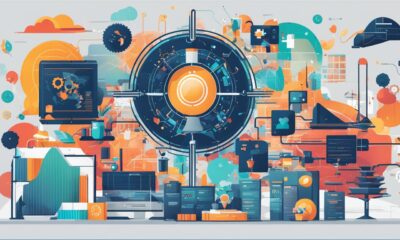AI News
Maximizing Impact: Harnessing AI for Social Good Today

In today’s rapidly evolving world, the power of artificial intelligence (AI) to drive substantial advancement and yield considerable benefits for society is clear. With AI’s ability to transform industries and elevate human welfare, it has become a powerful tool in addressing societal challenges and creating a better future for all.
AI for Social Good has emerged as a key focus area, where the ethical applications of AI can be leveraged to tackle pressing issues such as healthcare, education, sustainability, and poverty alleviation. By harnessing the potential of AI, we can maximize its impact in addressing social challenges and creating a more equitable society.
Key Takeaways:
- AI has the potential to provide economic opportunities, improve healthcare diagnostics, enhance education, and promote environmental sustainability.
- Connectivity and internet access are crucial for ensuring inclusivity and bridging the digital divide in AI development.
- The availability of high-quality data is essential for maximizing the impact of AI algorithms in addressing social challenges.
- Governments play a vital role in driving AI development by upskilling their citizens and incentivizing private sector involvement.
- Ethical considerations, such as algorithmic biases and humanization of technology, must be addressed to ensure fair and equitable AI development.
The Importance of Connectivity for AI Development
In today’s rapidly evolving digital landscape, access to the internet plays a crucial role in harnessing the potential of artificial intelligence (AI) for social good. However, half of Asia’s population still lacks internet connectivity, leading to a growing concern over the emergence of a new AI divide. To maximize the impact of AI algorithms in addressing social challenges, it is imperative to prioritize digital inclusivity and ensure last-mile internet connectivity for all.
The digital divide represents a barrier to entry for individuals and communities who are unable to access the internet. Without internet connectivity, these populations are left behind in the race to leverage AI technologies for social good. Governments and the private sector must collaborate to bridge this gap, investing in infrastructure and policies that promote inclusive growth and development. By prioritizing internet connectivity, we can create an environment that fosters equitable access to AI innovations.
| Country | Percentage of Population with Internet Access |
|---|---|
| China | 61.2% |
| India | 34.5% |
| Indonesia | 56.7% |
| Pakistan | 26.7% |
| Myanmar | 23.0% |
As we work towards a more inclusive society, it is crucial to address the digital divide by providing affordable internet access and empowering individuals with the skills to navigate the digital world. By closing the AI divide, we can tap into the full potential of AI for social good, ensuring that no one is left behind in this technological revolution.
The Role of Data in AI Applications
The successful application of artificial intelligence (AI) in addressing social challenges relies heavily on the availability of high-quality and representative data. Data serves as the foundation for training AI algorithms and enabling them to make accurate predictions and valuable insights. Without access to reliable and diverse datasets, the potential impact of AI in driving social good is limited.
One initiative that aims to bridge the gap of data availability is the Lacuna Fund. The Lacuna Fund focuses on making annotated data accessible to innovators working on AI-driven solutions for social good. By providing funding and resources, the Lacuna Fund enables the creation of training datasets that capture the complexities and nuances of real-world challenges.
“High-quality, reliable, and representative data is the fuel that powers AI algorithms to address social challenges effectively.” – Lacuna Fund
By leveraging the Lacuna Fund and similar initiatives, AI practitioners can access the data necessary to develop AI applications that benefit the most vulnerable communities. This opens up opportunities for innovative solutions in areas such as healthcare, education, sustainability, and poverty alleviation.
| Data Availability | Challenges | Solutions |
|---|---|---|
| Access to diverse and representative datasets | Digital divide, lack of resources | The Lacuna Fund, funding and support for data collection |
| Availability of high-quality and reliable data | Data privacy concerns, data collection methodologies | Data anonymization techniques, rigorous data collection protocols |
| Data annotation and labeling | Lack of manpower and expertise | Crowdsourcing platforms, collaboration with domain experts |
By addressing the challenges surrounding data availability, AI practitioners can unlock the full potential of AI in driving social good and creating positive change.
Government Role in Driving AI Development
The development and adoption of artificial intelligence (AI) technologies have the potential to significantly impact society. As governments around the world recognize this, they are taking active steps to drive the advancement of AI and ensure its benefits are maximized. Government interventions are crucial in upskilling their citizens, promoting digital skills development, incentivizing private sector involvement, and facilitating AI investment.
Upskilling and Digital Skills Development
To fully harness the potential of AI, governments are prioritizing upskilling initiatives to equip their citizens with the necessary digital skills. Through comprehensive training programs and partnerships with academic institutions and industry leaders, individuals can acquire the knowledge and expertise needed to adapt to the digital age. By investing in upskilling, governments are promoting inclusivity and addressing the potential risks of a digital divide.
Incentivizing Private Sector Involvement
Governments are recognizing the importance of private sector engagement in driving AI development. To incentivize businesses to invest in AI, governments may offer tax benefits, grants, or funding opportunities. By creating a favorable environment for AI innovation, governments encourage collaboration between the public and private sectors, leading to the creation of AI solutions that address social and environmental challenges.
Facilitating AI Investment
Government support plays a critical role in providing the necessary resources and infrastructure for AI research and development. By allocating funding to AI initiatives, governments can foster innovation and accelerate the deployment of AI technologies. Additionally, governments can establish regulatory frameworks that promote responsible AI development, ensuring that ethical considerations are integrated into the implementation of AI solutions.
| Government Interventions | Key Objectives |
|---|---|
| Upskilling Initiatives | Equip citizens with digital skills |
| Incentives for Private Sector Involvement | Encourage AI investment and collaboration |
| Facilitating AI Investment | Provide funding and regulatory support |
As governments continue to drive AI development, it is essential to strike a balance between technological advancement and ethical considerations. By creating a supportive environment for AI innovation and investment, governments can ensure that the benefits of AI are accessible to all and contribute to a more inclusive and equitable future.
Ensuring Ethical AI Development
When it comes to harnessing the power of artificial intelligence (AI) for social good, it is essential to address the challenges of algorithmic biases and algorithmic harms. As we rely more on AI systems to make critical decisions that impact individuals and communities, it becomes imperative to humanize technology and ensure fairness, transparency, and accountability.
The Algorithmic Justice League, founded by Joy Buolamwini, is at the forefront of advocating for ethical AI development. The organization actively works to raise awareness about the biases present in AI algorithms and promotes the importance of a diverse and inclusive approach to designing and implementing AI systems. By challenging the status quo and urging developers to confront their biases, the Algorithmic Justice League is driving positive change and advocating for equitable AI solutions.
The Algorithmic Justice League highlights the importance of recognizing that AI systems are created by humans and can inherit and perpetuate their biases. By addressing these biases, we can ensure that AI serves everyone fairly and does not discriminate against marginalized communities.
Creating ethical AI systems requires an understanding of the potential harms they can cause. It is crucial to critically examine the data used to train AI algorithms and identify any biases or unfairness. Additionally, ongoing monitoring and robust evaluation of AI systems are necessary to detect and correct any unintended consequences that may arise.
The Impact of Ethical AI
When AI development is approached ethically, it can have a profound impact on society. From improving accessibility and inclusivity to empowering individuals and communities, ethical AI has the potential to transform lives for the better. By prioritizing human values, fairness, and social impact, we can ensure that AI technologies are designed and implemented in a way that benefits all.
| Ethical AI Benefits | Ethical AI Considerations |
|---|---|
|
|
By addressing algorithmic biases, promoting transparency, and ensuring accountability, we can build a future where AI is a force for positive change. It is our collective responsibility to humanize technology and shape an ethical framework that guides the development and deployment of AI systems.
AI in Healthcare
Artificial intelligence (AI) is transforming the healthcare industry, revolutionizing the way we diagnose and treat medical conditions. With the help of machine learning algorithms, AI systems can analyze vast amounts of medical data, enabling accurate and timely diagnoses. Predictive analytics, another application of AI in healthcare, provide critical insights that assist healthcare professionals in making informed decisions about patient care.
Telemedicine platforms powered by AI technology are bridging the gap in access to healthcare services, particularly for patients in remote areas. These platforms allow patients to consult with healthcare providers remotely, reducing the need for in-person visits and increasing convenience. By democratizing healthcare through telemedicine, AI is making healthcare services more accessible and inclusive, ensuring that more people can receive the care they need.
To illustrate the impact of AI in healthcare, consider the following table:
| Application | Benefits |
|---|---|
| Diagnosis and Treatment | AI algorithms can analyze patient data and medical images to assist in accurate diagnoses and personalized treatment plans. |
| Predictive Analytics | AI algorithms can predict disease progression, identify high-risk patients, and provide insights for preventive measures. |
| Telemedicine | AI-powered telemedicine platforms enable remote consultations, expanding access to healthcare services for underserved populations. |
By harnessing the power of AI in healthcare, we can improve patient outcomes, enhance the efficiency of healthcare systems, and ultimately save lives. However, it is essential to address ethical considerations and ensure that AI technologies are developed and deployed responsibly, with a focus on patient privacy and security.
AI in Education
AI is revolutionizing education by enabling adaptive learning systems that personalize the learning experience for each individual student. These systems use advanced algorithms to tailor educational content and activities based on the unique needs, strengths, and weaknesses of each learner. By analyzing data on student performance and behavior, AI-powered platforms can identify areas for improvement and provide targeted interventions to help students succeed. This personalized approach to learning ensures that students receive the support and resources they need to reach their full potential.
Inclusive education is another area where AI is making a significant impact. Assistive technologies powered by AI are helping students with disabilities overcome barriers to learning and participation. For example, language processing algorithms and voice recognition technology enable students with speech and hearing impairments to communicate and engage with educational materials effectively. AI-powered tools also provide real-time feedback and support, empowering students with disabilities to actively participate in the learning process and succeed in inclusive classrooms.
“AI in education is transforming the way we teach and learn, making education more personalized, inclusive, and effective. Adaptive learning systems and assistive technologies are empowering students to reach their full potential and breaking down barriers to learning. As we continue to harness the power of AI in education, we are creating a future where every student can thrive.”
Benefits of AI in Education
AI in education offers numerous benefits that contribute to improved learning outcomes and student success:
- Personalized learning: AI adapts educational content and activities to match the unique needs and learning styles of individual students.
- Increased accessibility: Assistive technologies powered by AI enable students with disabilities to overcome learning barriers and participate fully in the educational process.
- Efficient assessment and feedback: AI-powered tools facilitate real-time assessment and provide instant feedback to students, allowing for timely interventions and support.
- Enhanced engagement: Interactive and immersive AI-driven educational resources captivate students’ attention and foster active participation in the learning process.
Conclusion
The integration of AI in education is reshaping the way we teach and learn, creating more personalized and inclusive learning experiences. Adaptive learning systems and assistive technologies powered by AI are unlocking the potential of every student, regardless of their learning style or abilities. As we continue to explore the possibilities of AI in education, it is important to ensure a responsible and ethical approach, leveraging technology to enhance education while addressing concerns about data privacy, algorithmic biases, and the human role in education. By harnessing AI for education, we can create a future where every student has the opportunity to thrive.
AI in Sustainability
AI is being leveraged to address one of the most pressing global challenges: sustainability. By harnessing the power of artificial intelligence, we can predict and mitigate the effects of climate change, optimize energy consumption, and reduce waste. The application of AI in sustainability initiatives is paving the way for a greener and more sustainable future.
One of the key areas where AI is making a significant impact is climate change prediction. AI algorithms can analyze vast amounts of data, including historical climate patterns, to provide accurate predictions of future climate trends. This information is invaluable for policymakers and organizations working to develop strategies for climate change mitigation and adaptation.
Energy efficiency is another area where AI plays a crucial role. Smart grids, which use AI algorithms to optimize energy distribution, enable more efficient and sustainable use of resources. These intelligent systems can automatically adjust energy supply based on demand, reducing waste and minimizing the environmental impact of energy production.
The application of AI in sustainability initiatives is paving the way for a greener and more sustainable future.
Reducing waste is another significant aspect of sustainable development, and AI can help optimize waste management systems. By analyzing data on waste generation, collection routes, and disposal methods, AI can identify inefficiencies and suggest improvements. This can lead to more effective recycling programs, reduced landfill waste, and a more circular and sustainable approach to waste management.
| AI Applications in Sustainability | Benefits |
|---|---|
| Climate Change Prediction | Accurate forecasts aid in developing effective mitigation strategies |
| Energy Efficiency | Optimizes energy consumption and reduces waste |
| Waste Management | Identifies inefficiencies and suggests improvements for more sustainable waste disposal |
Conclusion
The integration of AI in sustainability initiatives has the potential to drive significant positive change. By harnessing the power of AI to predict climate change, optimize energy use, and improve waste management, we can work towards a greener and more sustainable future. However, it is crucial to ensure that the ethical considerations of AI development are always prioritized. Through collaborative efforts and a commitment to responsible AI innovation, we can maximize the benefits of AI technologies for the betterment of our planet and society as a whole.
AI in Poverty Alleviation
Artificial intelligence (AI) is proving to be a powerful tool in the fight against poverty. By leveraging AI technologies, we can analyze economic data, predict poverty trends, and inform policy-making for targeted poverty alleviation interventions. Additionally, AI enables financial inclusion by assessing credit risk for individuals without traditional banking services.
In the realm of economic data analysis, AI algorithms can process vast amounts of information and identify patterns that help us understand the factors contributing to poverty. By analyzing data on unemployment rates, income distribution, and other economic indicators, we can gain valuable insights to inform policy decisions that address the root causes of poverty.
AI algorithms can help predict poverty trends by analyzing demographic data, economic indicators, and social welfare program outcomes. This predictive capability allows policymakers to proactively allocate resources and tailor interventions to areas with the highest poverty risks.
Financial inclusion is another crucial aspect of poverty alleviation, and AI plays a pivotal role here as well. Traditional banks often rely on credit histories when assessing loan applications, leaving individuals without a credit history or collateral at a disadvantage. AI algorithms can assess creditworthiness based on alternative data sources, such as mobile phone usage patterns and social media activity, enabling financial institutions to extend loans and financial services to previously underserved populations.
The Impact of AI in Poverty Alleviation
The use of AI in poverty alleviation has the potential to revolutionize the way we tackle this complex issue. By harnessing the power of economic data analysis and predictive algorithms, policymakers can make more informed decisions, allocate resources effectively, and design targeted interventions. Moreover, AI-driven financial inclusion opens up opportunities for individuals to access capital and financial services, empowering them to create sustainable livelihoods and break the cycle of poverty.
| Benefit | Description |
|---|---|
| Informed Policy Decisions | AI algorithms analyze economic data to provide insights for policymakers, enabling them to formulate evidence-based strategies to combat poverty. |
| Predictive Capability | By utilizing AI, we can predict poverty trends and allocate resources accordingly, ensuring interventions are targeted where they are needed most. |
| Financial Inclusion | AI algorithms assess creditworthiness based on alternative data sources, enabling financial institutions to extend loans and services to underserved populations. |
In conclusion, AI tools are a game-changer in the fight against poverty. Through economic data analysis, predictive algorithms, and financial inclusion initiatives, AI can help us identify and address the root causes of poverty, make informed policy decisions, and empower individuals to improve their economic well-being. By harnessing the potential of AI in poverty alleviation, we can work towards creating a more equitable and prosperous society for all.
Balancing Technological Advancement and Ethical Considerations
As we continue to harness the power of artificial intelligence (AI) for social good, it is essential to strike a balance between technological advancement and ethical considerations. We must ensure that the benefits of AI are accessible to all and that its use is guided by principles of fairness, transparency, and accountability.
One of the key ethical considerations is accessibility. AI technologies should be designed in a way that does not create barriers for individuals with disabilities or marginalized communities. By prioritizing accessibility, we can ensure that AI algorithms and applications are inclusive and cater to the diverse needs of society.
Data privacy is another crucial aspect of ethical AI development. As AI relies heavily on data, it is essential to protect the privacy and security of individuals’ personal information. Robust data protection measures and regulations are necessary to build trust and maintain the integrity of AI systems.
Algorithmic bias is a significant concern when it comes to AI applications. Biases present in training data or underlying algorithms can lead to discriminatory outcomes, reinforcing existing inequalities. By actively addressing and mitigating algorithmic bias, we can strive for fair and unbiased AI systems that promote equality and social justice.
Table: Key Considerations for Balancing Technological Advancement and Ethical AI
| Consideration | Description |
|---|---|
| Accessibility | Ensuring that AI technologies are accessible to all individuals, including those with disabilities or from marginalized communities. |
| Data Privacy | Protecting the privacy and security of personal data used in AI systems to build trust and maintain ethical standards. |
| Algorithmic Bias | Addressing and mitigating biases in AI algorithms to avoid discriminatory outcomes and promote fairness. |
By considering these key ethical aspects and ensuring that AI is developed and deployed responsibly, we can harness the full potential of AI while minimizing any negative consequences. It requires a collective effort from all stakeholders – governments, businesses, developers, and users – to create an ethical framework that guides the use of AI for social good.
As we navigate the evolving landscape of AI, it is crucial to continuously evaluate and update ethical standards and guidelines. By doing so, we can ensure that technological advancement aligns with our societal values and contributes to a more equitable and inclusive future.
Collaborative Efforts for Harnessing AI
The management of AI is not just a technical challenge but also a societal one. To maximize its potential for social good, we must come together in a consolidated effort, involving individuals, businesses, governments, nonprofits, and philanthropies. By prioritizing ethical AI-led innovations, we can address the societal challenges we face today.
Collaboration is key in harnessing AI’s power for the greater good. It is through collective action that we can ensure AI technologies are developed and utilized responsibly. By working together, we can create a future where AI benefits all, leaving no one behind.
Collaboration for Ethical AI-Led Innovations
One of the essential aspects of our collective effort is the focus on ethical AI-led innovations. We must foster an environment that encourages the development of AI technologies that prioritize social benefit and minimize the potential for harm. Through collaboration, we can establish guidelines and best practices that guide the ethical development and deployment of AI applications.
Moreover, collaboration enables us to share insights, knowledge, and resources to address the societal challenges we face. By pooling our expertise and capabilities, we can accelerate the development of AI solutions that tackle critical issues such as healthcare disparities, education inequities, environmental sustainability, and poverty alleviation.
| Benefits of Collaborative Efforts for Harnessing AI | Challenges Addressed |
|---|---|
| Accelerated development of AI solutions | Healthcare disparities |
| Increased access to resources and expertise | Education inequities |
| Shared best practices and guidelines | Environmental sustainability |
| Maximized social benefit of AI technologies | Poverty alleviation |
Through collaborative efforts, we can harness AI’s potential to transform society positively. By focusing on ethical AI-led innovations, we can address the societal challenges we face today and create a more inclusive and equitable future.
Collaboration is the key to unlock the true potential of AI for social good. By working together, we can ensure that AI technologies are designed, developed, and deployed in a way that benefits all, leaving no one behind. Let’s join forces and use AI as a tool to address the pressing societal challenges we face.
Key Policy Initiatives and Support
Policy initiatives and support play a crucial role in harnessing the power of AI for social good. Governments and organizations worldwide are implementing strategies and measures to promote inclusive business practices, support vulnerable populations, and provide tax incentives. These initiatives aim to create a more equitable society where technology-driven innovations benefit those in need.
One significant policy initiative is the Social Enterprise Act in Thailand. This legislation supports enterprises that have a social mission by providing them with legal recognition and access to resources and funding. The act encourages businesses to incorporate social objectives into their operations, promoting the creation of goods and services that address societal challenges.
“The Social Enterprise Act in Thailand recognizes the important role that businesses can play in driving positive social change. By encouraging enterprises to focus on social impact, this legislation creates opportunities for innovative solutions to address pressing issues such as poverty, education, and healthcare.” – Minister of Economy and Society
Another example of policy support for inclusive business practices is the inclusive business accreditation system in the Philippines. This system certifies businesses that actively engage with marginalized communities and include them as stakeholders in their value chain. Through this accreditation, businesses demonstrate their commitment to social inclusion and contribute to poverty reduction and economic empowerment.
Tax incentives are also crucial in promoting social enterprise development. Governments can provide tax breaks or exemptions to businesses that prioritize social objectives and contribute to the well-being of vulnerable populations. These incentives encourage businesses to invest in initiatives that have a positive social impact, fostering sustainable development and inclusive growth.
| Policy Initiative | Country | Description |
|---|---|---|
| Social Enterprise Act | Thailand | Legislation that supports social enterprises, providing legal recognition and access to resources and funding. |
| Inclusive Business Accreditation | Philippines | An accreditation system that certifies businesses actively engaging with marginalized communities. |
| Tax Incentives | Various Countries | Government-provided tax breaks or exemptions for businesses focusing on social objectives. |
By implementing key policy initiatives like the Social Enterprise Act, inclusive business accreditation systems, and tax incentives, governments can create an enabling environment for social enterprises and encourage businesses to embrace social impact. These initiatives pave the way for the development of innovative solutions that address societal challenges while ensuring the well-being of vulnerable populations.

Ethical AI Education and Awareness
As we continue to harness the power of artificial intelligence (AI) for social good, it is imperative that we prioritize ethical considerations. This includes educating developers and raising awareness about the potential harms and biases that can arise from AI systems. By equipping developers with the necessary knowledge and tools, we can work towards building unbiased and inclusive AI systems that benefit all communities.
To promote ethical AI development, AI training programs should be implemented to ensure that developers understand the importance of fairness, transparency, and accountability in AI algorithms. These programs can cover topics such as algorithmic biases, data privacy, and the ethical use of AI in various domains. By incorporating ethical guidelines and best practices into AI training, we can mitigate potential harms and ensure that AI is used responsibly and ethically.
Alongside AI training programs, awareness initiatives are crucial for educating the broader public about the ethical considerations of AI systems. These initiatives can include workshops, seminars, and public campaigns that highlight the importance of ethical AI and its potential impact on society. By fostering a better understanding of AI ethics among the general public, we can encourage informed discussions and informed decision-making about the use of AI in various contexts.
Ultimately, ethical AI education and awareness are essential components in mitigating the potential harms of AI systems. By equipping developers and the public with the necessary knowledge and tools, we can build a future where AI is used responsibly, inclusively, and for the benefit of all.
Table: Ethical Considerations in AI Development
| Ethical Consideration | Description |
|---|---|
| Algorithmic Biases | Ensure that AI algorithms are free from discriminatory biases and do not perpetuate unfairness or discrimination. |
| Data Privacy | Implement strong data protection measures to safeguard individuals’ privacy and prevent unauthorized access to personal information. |
| Transparency | Ensure that AI systems are transparent and understandable, providing explanations for their decisions and actions. |
| Fairness | Ensure that AI systems treat all individuals and groups fairly and without discrimination. |
| Accountability | Establish mechanisms to hold developers and organizations accountable for the actions and decisions of AI systems. |
Maximizing the Benefits of AI Technologies
As we continue to integrate AI technologies into various aspects of society, it is crucial that we collectively prioritize ethical AI-led innovations to maximize social benefit. By addressing societal challenges through the conscious integration of technology, we can create a more inclusive and equitable future.
Technology integration should not be pursued solely for its own sake but rather with a focus on solving real-world problems. By identifying the pressing social issues faced by communities, we can leverage AI technologies to develop innovative solutions. This requires a collective effort from individuals, businesses, governments, nonprofits, and philanthropies, each contributing their unique perspectives and resources.
One way to maximize the benefits of AI technologies is through collaboration and knowledge sharing. By fostering an environment of open communication and collaboration, we can harness the collective wisdom and expertise of diverse stakeholders. This collaborative approach can lead to the development of AI solutions that address the unique needs of different communities and promote social good.
| Societal Challenges | AI Integration |
|---|---|
| Poverty | AI tools can analyze economic data and predict poverty trends, enabling targeted interventions for poverty alleviation. |
| Healthcare | AI algorithms aid in diagnosis and treatment, while predictive analytics provide critical insights for healthcare professionals. |
| Education | Adaptive learning systems powered by AI cater to the unique needs of individual learners, making education more inclusive. |
| Sustainability | AI is leveraged to predict and mitigate the effects of climate change, optimizing energy consumption and reducing waste. |
“The integration of AI technologies requires a shared commitment to ethical development and responsible use. By placing societal needs at the forefront, we can ensure that AI innovations maximize social benefit and contribute to a more equitable future.” – AI for Good Alliance
In summary, maximizing the benefits of AI technologies involves a collective effort to integrate AI into various sectors to address societal challenges. By fostering collaboration, sharing knowledge, and prioritizing ethical development, we can harness the potential of AI to create positive change and solve pressing social issues.

Future Outlook for AI and Social Good
The future of AI and its potential for social good is both promising and complex. As we navigate the path forward, it is crucial to prioritize an equitable future where technology and empathy go hand in hand to solve societal challenges. By leveraging AI’s problem-solving capabilities, we can address pressing issues in healthcare, education, sustainability, and poverty alleviation.
Technology has the power to revolutionize healthcare, and AI is at the forefront of this transformation. With advanced algorithms and predictive analytics, AI can assist in diagnosing and treating diseases, improving patient outcomes. Moreover, telemedicine platforms powered by AI bridge gaps in access to healthcare services, ensuring that even the most vulnerable communities have access to quality care.
In the realm of education, AI holds the promise of personalized and inclusive learning experiences. Adaptive learning systems cater to the unique needs of individual learners, while language processing algorithms and voice recognition technology enable education for learners with disabilities. Through these advancements, AI can help create a more equitable education system that empowers learners of all backgrounds.
Sustainability is a pressing global issue, and AI can play a significant role in mitigating the effects of climate change. By modeling weather patterns and optimizing energy consumption, AI technologies contribute to climate change prediction and energy efficiency. With the implementation of smart grids and buildings, AI can help reduce waste and promote sustainable practices for a greener future.
| Advantages of AI in Social Good | Challenges in AI for Social Good |
|---|---|
|
|
“The convergence of AI and social good presents immense opportunities for problem-solving in sectors like healthcare, education, sustainability, and poverty alleviation.” – John Johnson, AI researcher
However, achieving the full potential of AI for social good requires addressing challenges such as algorithmic biases, data privacy concerns, and ensuring accessibility for all. By actively working towards a more inclusive and ethical AI ecosystem, we can harness the power of technology to create positive change and shape a better future for all.
Conclusion
In conclusion, the potential of AI for social good is immense. By harnessing this technology, we can drive positive change and address societal challenges across various sectors. From healthcare and education to sustainability and poverty alleviation, AI innovation has the power to transform lives and create a more equitable future.
To maximize the benefits of AI for social good, several key factors must be considered. Connectivity and data availability are crucial for ensuring that AI technologies reach all communities. Government support, through investment and incentivizing the private sector, plays a vital role in driving AI development.
However, ethical considerations are of utmost importance. By addressing issues such as algorithmic biases, data privacy, and ethical use of AI, we can ensure that these technologies are accessible and beneficial to all. It requires a collaborative effort among individuals, businesses, governments, nonprofits, and philanthropies to prioritize ethical AI-led innovations that truly make a positive impact on society.
In conclusion, AI for social good holds great promise. By integrating technology with empathy and a focus on addressing societal challenges, we can unlock the full potential of AI innovation for the betterment of our communities and the world at large.
FAQ
What is the Fourth Industrial Revolution?
The Fourth Industrial Revolution refers to the ongoing transformation of economies, societies, and the environment through the integration of advanced technologies like artificial intelligence.
What is the potential of AI for social good?
AI has the potential to provide economic opportunities, improve healthcare diagnostics, enhance education, and promote environmental sustainability.
What is the digital divide?
The digital divide refers to the gap between those who have access to the internet and those who do not. It poses a risk of creating a new AI divide, where half of Asia’s population lacks internet access.
How can last-mile internet connectivity be ensured?
Last-mile internet connectivity can be ensured through prioritizing digital inclusivity and investment by governments and the private sector.
Why is data availability important for AI applications?
High-quality, reliable, and representative data is crucial for maximizing the impact of AI algorithms in addressing social challenges.
What is the Lacuna Fund?
The Lacuna Fund is an initiative that aims to make annotated data accessible to innovators, ensuring that AI benefits the most vulnerable communities.
How can governments drive AI development?
Governments can drive AI development by upskilling themselves and their citizens for the digital age, prioritizing AI investment to address social and environmental challenges, and incentivizing private sector involvement.
What are the concerns associated with AI development?
AI systems designed by humans can perpetuate biases and discrimination, ethical considerations such as algorithmic biases and data privacy, and the future of work are some concerns associated with AI development.
How can ethical AI development be ensured?
Ethical AI development requires raising awareness and educating developers on the pitfalls of biased systems. Organizations like the Algorithmic Justice League work to prevent and redress algorithmic harms.
How is AI transforming healthcare?
AI is revolutionizing healthcare by aiding in diagnosis and treatment through machine learning algorithms, providing critical insights through predictive analytics, and making healthcare more accessible through telemedicine platforms.
How is AI transforming education?
AI is transforming education through adaptive learning systems that cater to the unique needs of individual learners, making education more inclusive for learners with disabilities through language processing algorithms and voice recognition technology.
How is AI contributing to sustainability?
AI is being leveraged to predict and mitigate the effects of climate change by modeling weather patterns and optimizing energy consumption. Smart grids and buildings equipped with AI technology contribute to improved energy efficiency and sustainability.
How is AI used in poverty alleviation?
AI tools are used to analyze economic data, predict poverty trends, and inform policy-making for targeted poverty alleviation interventions. AI also enables financial inclusion by assessing credit risk for individuals without traditional banking services.
How can ethical considerations be balanced with technological advancement in AI?
Striking a balance between technological advancement and ethical considerations is crucial to ensure that the benefits of AI are accessible to all. Addressing concerns such as ethical use, data privacy, and algorithmic bias is essential for creating a more equitable future.
What is the role of collaboration in harnessing AI for social good?
Collaboration among individuals, businesses, governments, nonprofits, and philanthropies is necessary to prioritize ethical AI-led innovations that maximize social benefit and minimize harm.
What are some key policy initiatives and support for AI development?
Bold policy initiatives like the Social Enterprise Act in Thailand and the inclusive business accreditation system in the Philippines support enterprises with social objectives and provide tax incentives, promoting the provision of valuable goods and services to poor and low-income people.
How can ethical AI education and awareness be promoted?
Educating developers and raising awareness about the ethical considerations of AI systems is crucial for mitigating harms. Training programs and awareness initiatives can help developers build unbiased systems that benefit all communities.
How can the benefits of AI technologies be maximized?
By prioritizing ethical AI-led innovations, collaborating across sectors, and addressing societal challenges, the potential benefits of AI can be realized.
Bennett is the embodiment of versatility, adapting his writing to cover a broad spectrum of topics with professionalism and flair. Whether it’s breaking news, in-depth analyses, or feature pieces, Bennett’s contributions enrich Press Report with diverse perspectives and engaging content. His adaptability and keen journalistic instincts make him a vital member of our team, capable of capturing the essence of the moment in every story.
AI News
ByRetreat Celebrates the Exciting Relaunch of Coffee Lovers 101

Munich, 2024, May 16th — ByRetreat is delighted to announce the highly anticipated relaunch of Coffee Lovers 101, the ultimate online destination for coffee aficionados. The revamped website now offers an enriched user experience with updated content, innovative features, and a fresh new design, reaffirming its commitment to being the go-to resource for coffee enthusiasts worldwide.

About Coffee Lovers 101
Coffee Lovers 101 was founded by a dedicated group of coffee lovers who sought to share their passion and knowledge with a global audience. Over the years, it has become a beloved platform for anyone looking to deepen their understanding of coffee culture, brewing techniques, and the latest industry trends. The relaunch aims to elevate this experience by providing more comprehensive and engaging content.
Highlights of the Relaunch
- User-Friendly Design: The website has been completely redesigned to offer a more intuitive and seamless browsing experience. With an improved layout and navigation, visitors can easily find the information and resources they need.
- Expanded Content Library: Coffee Lovers 101 now features a wider array of articles, including detailed brewing guides, expert coffee tips, and up-to-date industry news. There’s something for everyone, from beginners to seasoned coffee drinkers.
- Thorough Product Reviews: With a dedicated product reviewer, the site offers in-depth and honest evaluations of the latest coffee appliances and accessories, helping readers make informed choices.
- Enhanced Community Interaction: The new Coffee Lovers 101 places a strong emphasis on community, introducing more interactive features such as forums, social media integration, and opportunities for user-generated content.
Meet the Team

The relaunch is driven by a talented and passionate team of coffee experts and content creators:
- Emma, Editor-in-Chief: Formerly with StrongMocha News Group, Emma leads the editorial team with a deep love for coffee and a sharp editorial eye.
- Jack, Content Creator: Jack, previously at Candy Artisans, brings his storytelling skills to create captivating and informative coffee-related content.
- Sophie, Social Media Manager: With her successful background at ByRetreat, Sophie enhances the site’s social media presence, fostering a vibrant and engaged community.
- Liam, Product Reviewer: Liam’s meticulous approach to product reviews, honed at Eat More Butter, provides readers with reliable insights into the best coffee gadgets on the market.
- Olivia, Marketing Specialist: Olivia’s expertise in digital marketing, developed at Cappuccino Oracle, drives the growth and visibility of Coffee Lovers 101, ensuring it reaches a global audience.
Quotes
Sophie, the Social Media Manager, expressed her enthusiasm for the relaunch: “At ByRetreat, we understand the importance of community and connection. The new Coffee Lovers 101 embodies these values and offers a fantastic platform for coffee lovers to learn, share, and grow together.”
About ByRetreat
ByRetreat is a leading digital platform that curates the best in lifestyle, wellness, and community engagement. Our mission is to connect individuals with the resources and inspiration they need to live their best lives. We are proud to support Coffee Lovers 101 in its journey to become the premier coffee resource on the web.
Contact Information
For more information about the relaunch of Coffee Lovers 101, please contact:
- Email: press@byretreat.com
- Website: www.byretreat.com
With the relaunch of Coffee Lovers 101, coffee enthusiasts everywhere have a renewed resource to deepen their appreciation and knowledge of coffee. Visit www.coffeelovers101.com to explore the new features and join the vibrant community of coffee lovers.

Olivia stands at the helm of Press Report as our Editor-in-chief, embodying the pinnacle of professionalism in the press industry. Her meticulous approach to journalism and unwavering commitment to truth and accuracy set the standard for our editorial practices. Olivia’s leadership ensures that Press Report remains a trusted source of news, maintaining the highest journalistic integrity in every story we publish.
AI News
StrongMocha News Group Announces the Exciting Relaunch of Coffee Lovers 101

Munich, 2024. May 16th — StrongMocha News Group is thrilled to announce the relaunch of Coffee Lovers 101, the premier online destination for coffee enthusiasts. The revamped site promises to deliver an enriched experience with new content, features, and a fresh look, reaffirming its commitment to providing the best in coffee knowledge, reviews, and community engagement.
About Coffee Lovers 101
Coffee Lovers 101, originally launched by a group of passionate coffee aficionados, has grown into a beloved resource for coffee lovers around the globe. The website covers everything from brewing techniques and product reviews to the latest trends in the coffee industry. With its relaunch, Coffee Lovers 101 aims to offer even more value to its readers with updated content and improved user experience.

Key Features of the Relaunch
- Enhanced User Experience: The website has been completely redesigned to ensure a more intuitive and user-friendly experience. The new layout makes navigating and finding the necessary information easier for visitors.
- Expanded Content: Coffee Lovers 101 now features a broader range of articles, including in-depth guides, expert tips, and industry news. Whether you are a novice or a seasoned coffee drinker, there’s something for everyone.
- Comprehensive Product Reviews: With a dedicated product reviewer, Coffee Lovers 101 provides honest and thorough reviews of the latest coffee appliances and gadgets, helping readers make informed purchasing decisions.
- Community Engagement: The revamped site emphasizes community more, with more interactive features such as forums, social media integration, and opportunities for user-generated content.
Meet the Team
A dynamic team of coffee experts and content creators spearheads the relaunch of Coffee Lovers 101:
- Emma, Editor-in-Chief: With her background at StrongMocha News Group, Emma leads the editorial team with a keen eye for detail and a passion for coffee innovation.
- Jack, Content Creator: Jack brings his storytelling expertise from Candy Artisans, crafting engaging and informative articles that captivate readers.
- Sophie, Social Media Manager: Sophie’s experience at ByRetreat ensures that Coffee Lovers 101’s social media presence is vibrant and interactive.
- Liam, Product Reviewer: Formerly with Eat More Butter, Liam’s meticulous approach to product reviews provides readers with reliable and comprehensive insights.
- Olivia, Marketing Specialist: Olivia’s marketing prowess, honed at Cappuccino Oracle, drives the website’s growth and visibility, reaching coffee lovers far and wide.
Quotes
Emma, the Editor-in-Chief, shared her excitement about the relaunch: “We are thrilled to bring Coffee Lovers 101 into a new era with a fresh look and expanded content. We aim to continue inspiring and educating our community about the wonderful world of coffee.”
About StrongMocha News Group
StrongMocha News Group is a leading provider of high-quality content across various niches, including food, technology, and lifestyle. Committed to excellence and innovation, It strives to deliver engaging and informative content to its diverse audience.

Contact Information
For more information about the relaunch of Coffee Lovers 101, please contact:
- Email: press@strongmocha.com
- Website: www.strongmocha.com
This press release marks a significant milestone in Coffee Lovers 101’s journey. With its relaunch, the website will become an even more essential resource for coffee enthusiasts everywhere. Visit www.coffeelovers101.com to explore the new features and join the community of passionate coffee lovers.
AI News
Understanding and Promoting Ethical AI Practices

As artificial intelligence (AI) becomes more integrated into our daily activities, understanding and promoting ethical AI practices is crucial. Ethical AI refers to the conscientious development and deployment of AI systems, emphasizing fairness, transparency, and accountability. Adhering to ethical standards ensures that AI technologies are unbiased, dependable, and beneficial for both businesses and the broader community.
At its core, ethical AI entails making ethical decisions throughout the entire AI lifecycle. From the design stage to data sourcing, deployment, and ongoing monitoring, we must be conscious of the potential biases and risks associated with AI. By addressing these ethical quandaries, we can harness the power of AI while minimizing potential harm.
In this article, we will delve into the importance of ethical AI practices, the key principles of ethical AI, responsible AI development, ethical data sourcing and management, global perspectives on AI ethics, and the practical implementation of ethical AI. Through these discussions, we aim to equip businesses and individuals with the knowledge and tools necessary to navigate the complex landscape of AI ethics.
Key Takeaways
- Ethical AI involves making responsible decisions throughout the AI lifecycle
- Transparency, fairness, and accountability are key principles of ethical AI
- Responsible AI development requires considering the societal impact and mitigating biases
- Ethical data sourcing and management are essential for maintaining trust and privacy
- Global collaboration is crucial in establishing ethical standards for AI
The Importance of Ethical Data and AI Ethics in Business
As companies increasingly leverage data and artificial intelligence (AI) to create scalable solutions, it is crucial to recognize the importance of ethical practices in managing data and developing AI systems. Responsible AI development requires businesses to prioritize ethical data sourcing and management to mitigate reputational, regulatory, and legal risks associated with AI technologies.
One of the key ethical quandaries in AI is the potential for biased algorithms and discriminatory outcomes. In recent years, lawsuits against companies like IBM, Optum, and Goldman Sachs have highlighted the need for ethical data and AI practices. Allegations of misappropriation of data and biased AI algorithms emphasize the importance of ensuring fairness, transparency, and non-discrimination in AI systems.
“Ethical data sourcing and management are essential for businesses to build trust, maintain integrity, and protect user rights,” says our AI ethics expert. “By implementing strong data privacy practices, obtaining proper consent, and addressing biases, companies can establish responsible AI systems that respect human values and avoid harm.”
Developing AI ethics programs that address these risks is crucial for organizations. These programs help establish guidelines and frameworks that promote transparency, fairness, and accountability throughout the AI lifecycle. By integrating ethical considerations into AI development and decision-making processes, businesses can build trust, minimize biases, and ensure that AI technologies are used responsibly for the benefit of both customers and society.
Table 1 summarizes the importance of ethical data and AI ethics in business:
| Benefits | Risks |
|---|---|
|
|
By prioritizing ethical data practices and developing AI ethics programs, businesses can navigate the complexities of AI while minimizing risks and ensuring responsible AI development and deployment.
Responsible AI and Trustworthy AI Solutions
As we continue to embrace the benefits of artificial intelligence (AI), it is crucial that we prioritize responsible AI practices to ensure the ethical and accountable use of these powerful technologies. Responsible AI entails designing, developing, and deploying AI systems with good intentions, empowering both employees and businesses while preserving fairness and transparency for customers and society as a whole.
To achieve responsible AI, organizations must establish robust governance strategies that outline clear guidelines for ethical AI development and deployment. These strategies should address potential biases, consider principles such as transparency, fairness, and privacy, and provide a framework for the ongoing monitoring of AI impacts. By adhering to these principles and governance strategies, businesses can build trust and confidence in the AI solutions they offer.
Trustworthy AI solutions are those that prioritize ethical considerations throughout the entire AI lifecycle. This includes incorporating ethical principles from the design stage, ensuring transparent and fair decision-making processes, and regularly auditing AI systems to identify and address potential ethical risks. By promoting responsible AI practices and building trustworthy AI solutions, we can foster an ecosystem that benefits both businesses and society at large.
| Principles of Responsible AI | Key Actions for Trustworthy AI Solutions |
|---|---|
|
|
By adopting responsible AI practices and developing trustworthy AI solutions, we can harness the full potential of AI while minimizing ethical risks. This approach not only benefits businesses by building trust with customers and stakeholders but also ensures that AI technologies contribute positively to our society.
Key Principles of Ethical AI
In the development and deployment of AI systems, it is crucial to adhere to key principles that promote ethical AI practices. These principles guide us in creating AI technologies that respect human values, avoid harm, and act as a beneficial force in society. By following these principles, we can ensure that AI systems are transparent, fair, non-discriminatory, and prioritize privacy and data protection.
Transparency and explainability are fundamental principles of ethical AI. It is essential that the inner workings of AI systems are understandable and accessible to users. By providing transparency, we can foster trust and enable users to make informed decisions regarding the use of AI technologies. Explainability allows us to identify and rectify any biases or discriminatory outcomes that may arise from AI algorithms.
Fairness and non-discrimination are critical aspects of ethical AI. It is crucial to ensure that AI systems do not favor or discriminate against any individual or group based on characteristics such as race, gender, or socioeconomic status. By promoting fairness and non-discrimination, we can create AI technologies that contribute to a more equitable and inclusive society.
Respecting privacy and protecting data are essential in the development and deployment of AI systems. Ethical AI practices require us to handle user data responsibly, ensuring its security and safeguarding individual privacy rights. By prioritizing privacy and data protection, we can mitigate the risks associated with data breaches and ensure that AI technologies respect user rights.
Key Principles of Ethical AI:
| Principle | Description |
|---|---|
| Transparency | AI systems should provide clear and understandable explanations of their operation and decisions. |
| Explainability | AI systems should be able to explain their decision-making processes and identify any biases or discriminatory outcomes. |
| Fairness | AI systems should be designed to ensure fairness and avoid discrimination against individuals or groups. |
| Non-discrimination | AI systems should not discriminate against individuals based on characteristics such as race, gender, or socioeconomic status. |
| Privacy | AI systems should respect user privacy rights and handle data securely. |
| Data Protection | AI systems should protect user data from unauthorized access and breaches. |
Ethical Data Sourcing and Management for AI
In the realm of artificial intelligence (AI), ethical data sourcing and management are paramount to ensuring the responsible and trustworthy use of AI technologies. We understand that ethical considerations, such as data privacy, consent, data security, and data management, play a significant role in maintaining the integrity and reliability of AI systems.

When it comes to data sourcing, organizations must prioritize obtaining data in a manner that respects privacy, consent, and individual data rights. This means adhering to legal requirements and obtaining explicit consent from individuals for the use of their data. By doing so, businesses can mitigate legal risks and build trust with their users.
Additionally, proper data management is crucial for upholding ethical standards in AI. This includes secure storage, controlled access, and regulated deletion practices to protect data privacy and respect individual rights. By implementing robust data management protocols, organizations can ensure that AI systems operate with integrity and maintain user trust.
Ethical Data Sourcing and Management Best Practices
- Obtain data through legal and ethical means, ensuring compliance with applicable privacy regulations.
- Explicitly obtain informed consent from individuals before using their data for AI purposes.
- Implement strong data security measures to protect data against unauthorized access or breaches.
- Establish controlled access protocols to limit data handling to authorized individuals and prevent misuse.
- Adopt regulated deletion practices to remove unnecessary data and respect individuals’ rights to data erasure.
By adhering to these best practices, organizations can uphold ethical standards in data sourcing and management for AI, ultimately fostering trust and accountability in their AI systems. This approach is essential to ensure the responsible and ethical use of AI technologies, safeguarding the interests and rights of both businesses and users.
| Key Considerations | Benefits |
|---|---|
| Data Privacy | Protects individuals’ personal information and upholds their privacy rights. |
| Consent | Ensures that data usage is transparent and respectful of individuals’ choices. |
| Data Security | Prevents unauthorized access or breaches, safeguarding sensitive information. |
| Data Management | Ensures data is handled responsibly and complies with legal and regulatory requirements. |
| Trust | Builds user trust in AI systems by demonstrating ethical practices in data sourcing and management. |
Global Perspectives on AI Ethics
As the field of artificial intelligence continues to evolve, it has become increasingly important to consider the ethical implications of AI technologies. Global perspectives on AI ethics are emerging as countries and international organizations recognize the need to establish guidelines and regulations for the responsible development and use of AI.
Several countries have taken the lead in shaping AI ethics by publishing their own guidelines. The European Union, Singapore, and Canada, for example, have each released their own AI ethics frameworks, emphasizing the importance of fairness, accountability, and human-centered values in AI development and deployment.
International collaboration is crucial in establishing globally accepted ethical standards. By working together, countries can share best practices, learn from each other’s experiences, and create a unified approach to AI ethics. This collaborative effort will help ensure that AI technologies are used in a way that benefits society while minimizing potential risks.
The Role of Ethical Guidelines and AI Regulations
Ethical guidelines and AI regulations play a vital role in shaping the future of AI ethics. These guidelines provide a framework for organizations and individuals to follow, ensuring that AI technologies are developed and used responsibly. By adhering to ethical principles such as transparency, fairness, and privacy, companies can build trust with users and stakeholders.
AI regulations provide a legal framework for governing the use of AI technologies. They help address concerns such as data privacy, algorithmic bias, and accountability. By implementing regulations, governments can protect individuals’ rights and ensure that AI technologies are used in a way that aligns with societal values.
By combining ethical guidelines and AI regulations, organizations can establish a comprehensive approach to AI ethics. This approach focuses on creating human-centered AI systems that respect individual rights, minimize biases, and promote fair and accountable decision-making.
| Country/Organization | AI Ethics Guidelines |
|---|---|
| European Union | Emphasizes fairness, accountability, and transparency in AI development. |
| Singapore | Focuses on ethical AI governance, accountability, and public participation. |
| Canada | Highlights the importance of human-centric AI and responsible innovation. |
Practical Implementation of Ethical AI
Implementing ethical AI practices is crucial for organizations to ensure responsible and accountable use of artificial intelligence technologies throughout the AI lifecycle. From the design stage to data sourcing and auditing AI systems, ethical considerations must be integrated at every step.
When designing AI systems, it is essential to prioritize ethical principles to guide decision-making. This includes transparency, explainability, fairness, non-discrimination, privacy, and data protection. By incorporating these principles, organizations can develop AI systems that respect user rights, mitigate biases and discrimination, and act in the best interests of society.
Data sourcing plays a critical role in ethical AI implementation. Organizations need to ensure that data is sourced ethically, with respect for privacy, consent, and data rights. Additionally, proper data management practices like secure storage, controlled access, and regulated deletion are necessary to protect data privacy and individual rights. By implementing ethical data sourcing and management strategies, organizations can maintain the integrity of AI systems and build trust with users.
Regular monitoring and auditing of AI systems are essential to ensure ongoing ethical practices. This involves evaluating the impact and performance of AI systems, identifying potential biases or ethical risks, and taking appropriate actions to address them. By continuously assessing AI systems, organizations can identify and rectify ethical issues, improving the overall ethical integrity of their AI technologies.
Implementing Ethical AI: Key Considerations
When implementing ethical AI, there are several key considerations that organizations should keep in mind:
- Develop an AI design process that incorporates ethical principles from the outset.
- Formulate guidelines and policies that clearly define ethical standards for AI development and deployment.
- Train and educate employees on ethical AI practices and the potential risks associated with unethical AI.
- Establish an ethical review process for AI systems and algorithms to identify and remediate biases or ethical concerns.
- Engage with external stakeholders, such as customers, regulators, and ethics boards, to gather feedback and ensure accountability.
| Key Steps for Ethical AI Implementation | Description |
|---|---|
| Integrate ethical considerations in AI design | Ensure that ethical principles are embedded in the design and development process of AI systems. |
| Source data ethically | Obtain data in a way that respects privacy, consent, and data rights. |
| Implement robust data management practices | Securely store, control access, and regulate deletion of data to protect privacy and individual rights. |
| Monitor and audit AI systems | Regularly assess the impact and performance of AI systems, identify biases or ethical risks, and take appropriate actions to address them. |
“Ethical AI implementation requires a holistic approach that encompasses design, data, and ongoing monitoring. By incorporating ethical considerations throughout the AI lifecycle, organizations can build trust, mitigate risks, and ensure responsible AI practices.”
Implementing ethical AI practices is not only a moral imperative but also a strategic advantage for organizations. By prioritizing ethics in AI development and deployment, businesses can build trust with users, avoid reputational damage, and navigate regulatory requirements more effectively. Ethical AI is the foundation for a responsible and accountable AI ecosystem that benefits both organizations and society as a whole.
The Future of AI Ethics
As AI continues to advance, the future of AI ethics holds great importance in ensuring responsible and ethical development of AI technologies. With each advancement, ethical guidelines and regulations need to be developed and implemented to guide the use of AI in a way that respects human values and societal well-being.
The rapid progress in AI brings forth new opportunities and challenges. AI advancements have the potential to revolutionize industries, enhance decision-making processes, and drive innovation. However, they also raise ethical concerns regarding bias, transparency, privacy, and accountability.
The development and implementation of ethical guidelines and regulations are crucial to address these concerns and shape the future of AI ethics,” says Dr. Jane Anderson, an AI ethics expert. “Responsible AI development involves incorporating ethical considerations from the early stages of AI system design and continuously monitoring and evaluating its impact on society.”
Ethical guidelines and regulations provide a framework for responsible AI development. They ensure that AI technologies are developed and used in a way that is transparent, fair, and accountable. These guidelines help mitigate potential biases and discriminatory practices, protect user privacy and data rights, and establish trust between users and AI systems.
The future of AI ethics also relies on international collaboration and the establishment of global standards. By aligning ethical principles and sharing best practices, the global AI community can work together to create a unified approach to responsible AI development. This collaboration will enable the development of AI technologies that serve the best interests of humanity and contribute positively to society.
Key Future Considerations
- Continued development and refinement of ethical guidelines for AI advancements
- Increased focus on transparency and explainability in AI systems
- Addressing biases and promoting fairness in AI decision-making
- Strengthening privacy and data protection measures in AI development
- Ensuring accountability and responsible use of AI technologies
The future of AI ethics holds the promise of shaping the ethical landscape of AI technologies. By prioritizing responsible AI development and adhering to ethical guidelines and regulations, we can build a future where AI technologies work in harmony with human values, respect individual rights, and contribute to a more equitable and inclusive society.
| AI Advancements | Ethical Guidelines | AI Regulations | Responsible AI Development |
|---|---|---|---|
| Advancing AI technologies that drive innovation and transform industries | Establishing guidelines to ensure transparent, fair, and accountable AI development | Implementing regulations to address potential biases and protect user privacy | Prioritizing ethical considerations throughout the AI development lifecycle |
| Enhancing decision-making processes through AI algorithms and models | Addressing biases and promoting fairness in AI decision-making | Creating regulations that govern the responsible use of AI technologies | Monitoring and evaluating the ethical impact of AI systems on society |
| Exploring new frontiers in AI research and applications | Sharing best practices and fostering international collaboration on AI ethics | Building a regulatory framework that ensures ethical AI deployment | Encouraging responsible AI development through organizational policies and practices |
Conclusion
Understanding and promoting ethical AI practices is crucial in the ever-advancing field of artificial intelligence. By incorporating ethical guidelines and responsible AI principles, businesses and organizations can mitigate risks, build trust, and ensure the ethical use of AI technologies.
Responsible AI involves designing, developing, and deploying AI systems with good intentions, while considering the impact on customers and society. It requires the establishment of governance strategies, addressing biases, and adhering to principles such as transparency, fairness, and privacy.
Guidelines and regulations are being developed globally to shape the future of AI ethics. The European Union, Singapore, and Canada have already published their own AI ethics guidelines, emphasizing the importance of fairness, accountability, and human-centric values. International collaboration is vital in establishing global standards for the responsible use of AI.
Incorporating ethical considerations throughout the AI lifecycle, from design to deployment, is essential. Ethical data sourcing and management, along with continuous monitoring and auditing of AI systems, ensure that ethical practices are maintained. This builds trust between users and AI technologies.
We are committed to promoting ethical AI practices, adhering to ethical guidelines, and integrating responsible AI principles into our work. By doing so, we can harness the power of AI while safeguarding against potential risks and ensuring that AI technologies benefit society as a whole.
Case Studies: Ethical AI in Action
As businesses increasingly adopt artificial intelligence (AI) technologies, the importance of ethical AI practices becomes paramount. To understand the impact and potential of ethical AI, let’s explore real-life case studies from the healthcare and finance industries.
The Potential of AI in Healthcare
In the healthcare sector, AI has proven to be a game-changer, improving patient outcomes and revolutionizing medical research. For instance, the use of AI algorithms in medical imaging has led to more accurate diagnoses and faster treatment decisions. By analyzing medical images, AI systems can identify patterns and anomalies that may be missed by human observers. This not only saves time but also improves the accuracy of diagnoses, empowering healthcare professionals to make more informed decisions.
Another example of ethical AI in healthcare is the use of predictive analytics to identify patients at risk of developing certain diseases. By analyzing large datasets and applying machine learning algorithms, AI can predict disease patterns and help doctors intervene early, potentially saving lives.
Ethical AI in Finance
In the finance industry, AI is transforming processes and decision-making. For example, AI-powered chatbots are providing personalized financial advice to customers, improving accessibility and convenience. These chatbots use natural language processing and machine learning algorithms to understand customer queries and provide relevant information in a timely manner.
Additionally, AI algorithms are used for fraud detection and prevention in the finance sector. By analyzing large volumes of transaction data, these algorithms can identify patterns indicative of fraudulent activity. This helps financial institutions protect their customers and prevent financial losses.
| Case Study | Industry | Impact |
|---|---|---|
| AI in Medical Imaging | Healthcare | Improved accuracy and efficiency of diagnoses |
| Predictive Analytics for Disease Prevention | Healthcare | Early intervention and improved patient outcomes |
| AI-powered Chatbots | Finance | Personalized financial advice and improved customer experience |
| Fraud Detection with AI | Finance | Enhanced security and prevention of financial losses |
These case studies demonstrate the positive impact of ethical AI practices in various industries. By leveraging AI technologies responsibly and ethically, businesses can drive innovation while ensuring fairness, transparency, and accountability.
The Role of AI Ethics in Building Trust
Building trust is essential in any relationship, and the same applies to the interaction between users and AI systems. AI ethics plays a crucial role in fostering trust by ensuring responsible AI practices and ethical decision-making. When users perceive AI systems as trustworthy, they are more likely to engage with them and rely on their outputs.
Ethical decision-making is a cornerstone of building trust in AI systems. Organizations must prioritize transparency by clearly communicating how AI algorithms work and the data they rely on. By providing insights into the decision-making process, users can better understand and trust the outcomes generated by AI systems.
Responsible AI practices are also vital in building trust. Organizations should implement measures to address and mitigate biases in AI algorithms, ensuring fair and equitable outcomes. They should also establish accountability mechanisms to monitor AI systems and rectify any unintended consequences or unethical behavior. Trustworthy AI systems are those that are designed and developed with a strong ethical framework.
“Building trust in AI systems requires a commitment to responsible AI practices and ethical decision-making.”
By incorporating AI ethics into the development and deployment of AI technologies, organizations can build trust with users and stakeholders. This trust enables the adoption and acceptance of AI systems, leading to their successful integration into various domains and industries. It also paves the way for the ethical and responsible use of AI, fostering a positive societal impact and ensuring that AI technologies align with human values.
Table: Elements of Trustworthy AI Systems
| Element | Description |
|---|---|
| Transparency | Clearly communicating how AI algorithms work and the data they rely on. |
| Fairness | Mitigating biases and ensuring equitable outcomes from AI algorithms. |
| Accountability | Establishing mechanisms to monitor AI systems and address unintended consequences. |
| Ethical Framework | Designing and developing AI systems with a strong ethical foundation. |
Building trust in AI systems is an ongoing endeavor that requires continuous monitoring, evaluation, and improvement. As AI technologies advance, organizations must stay committed to ethical AI practices and adapt to emerging challenges. By prioritizing AI ethics, we can create a future where AI systems are trusted allies, benefiting individuals and society as a whole.
The Importance of Ethical Leadership in AI Development
In the rapidly evolving field of AI development, ethical leadership plays a crucial role in ensuring responsible and ethical practices. As we continue to harness the power of AI technologies, it becomes imperative for leaders to prioritize ethical decision-making, establish robust governance structures, and foster a culture that values ethical AI development.
Responsible AI development requires leaders who are committed to upholding ethical principles and ensuring that AI technologies are used in a way that benefits individuals and society as a whole. Ethical leadership sets the tone for the entire organization, emphasizing the importance of fairness, transparency, and accountability in all AI-related endeavors.
By promoting ethical leadership in AI development, we can mitigate the risks associated with AI technologies, such as biases, discrimination, and privacy concerns. Ethical leaders guide teams in making informed decisions, considering the societal impact of AI, and actively working towards creating AI systems that are trustworthy and accountable.
Furthermore, ethical leadership also involves establishing AI governance frameworks that provide guidelines and regulations for the development and deployment of AI technologies. These frameworks ensure that AI systems adhere to ethical standards, promoting the responsible use of AI and safeguarding against potential misuse or harm.
FAQ
What is ethical AI?
Ethical AI involves designing, developing, and deploying AI systems with good intentions, considering principles such as transparency, fairness, and privacy, and ensuring the responsible and accountable use of AI technologies.
Why is ethical AI important for businesses?
Ethical AI is important for businesses because it helps mitigate risks, build trust with customers and stakeholders, and ensures fair and responsible use of AI technologies, avoiding reputational, regulatory, and legal issues.
What are the key principles of ethical AI?
The key principles of ethical AI include transparency and explainability, fairness and non-discrimination, and privacy and data protection. These principles guide the development and deployment of AI systems that respect human values and avoid harm.
How can companies implement ethical AI practices?
Companies can implement ethical AI practices by identifying existing infrastructure, creating a data and AI ethical risk framework, learning from successes in healthcare ethics, optimizing guidance for product managers, building organizational awareness, incentivizing employees to identify AI ethical risks, and monitoring impacts and engaging stakeholders.
What is the future of AI ethics?
The future of AI ethics involves the development and implementation of ethical guidelines and regulations, responsible AI development and governance, and the establishment of global ethical standards to guide the ethical use of AI technologies.
How does ethical data sourcing and management relate to AI ethics?
Ethical data sourcing and management involve obtaining data in a way that respects privacy, consent, and data rights. It mitigates legal risks, maintains the integrity of AI systems, and protects user trust, all of which are important aspects of AI ethics.
Are there any global perspectives on AI ethics?
Yes, countries and international organizations like the European Union, Singapore, and Canada have published their own AI ethics guidelines, emphasizing fairness, accountability, and human-centric values. Global collaboration is essential for establishing globally accepted ethical standards for the responsible use of AI.
How can ethical AI be practically implemented?
Ethical AI can be practically implemented by integrating ethical considerations throughout the AI lifecycle, incorporating ethical principles from the design stage, ensuring transparent and fair decision-making, and practicing ethical data sourcing, management, monitoring, and auditing of AI systems.
What is the role of AI ethics in building trust?
AI ethics plays a crucial role in building trust in AI systems. Ethical decision-making, transparency, fairness, and accountability are key elements that establish trust between users and AI technologies. Prioritizing responsible AI practices helps build trust and increase user confidence in AI systems.
How important is ethical leadership in AI development?
Ethical leadership is vital in AI development to ensure the responsible and ethical use of AI technologies. Leaders need to prioritize ethical decision-making, establish governance structures, and foster a culture that values ethical AI practices. Ethical leadership sets the tone for responsible AI development and promotes a trustworthy and accountable AI ecosystem.
In an era where technology intersects with every aspect of life, Maxwell bridges the gap between artificial intelligence and journalism. As a writer and AI expert, he explores the implications of emerging technologies on society, economy, and culture. Maxwell’s expertise allows Press Report to offer forward-thinking insights into the future of AI, making complex topics accessible and engaging for our audience.
-

 AI in Legal2 weeks ago
AI in Legal2 weeks agoRevolutionizing Justice: How AI is Transforming the Legal Landscape
-

 AI Entertainment1 month ago
AI Entertainment1 month agoOpenAI Releases SORA: Breakthrough AI Platform
-

 AI in Business2 weeks ago
AI in Business2 weeks agoAI: The Powerhouse Driving Tomorrow’s Industries
-

 AI in Legal2 weeks ago
AI in Legal2 weeks agoFrom Briefs to Bytes: The Impact of AI on Legal Documentation
-

 AI in Business2 weeks ago
AI in Business2 weeks agoSecure Your Future with AI Data Privacy Assurance
-

 AI in Medicine2 weeks ago
AI in Medicine2 weeks agoRevolutionizing the Future: AI in Healthcare and Medicine
-

 AI Security2 weeks ago
AI Security2 weeks agoUnlock the Power of Robust AI Security for Your Business
-

 AI in Business2 weeks ago
AI in Business2 weeks agoAI’s Effect on Employment: Trends & Insights















